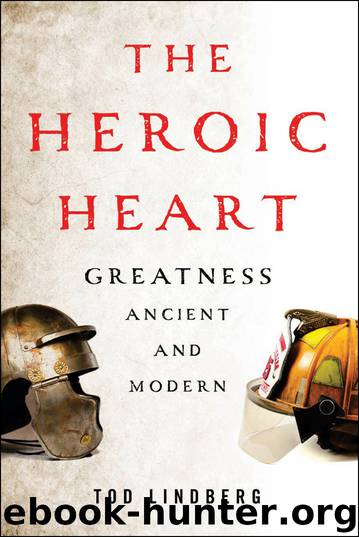The Heroic Heart by Tod Lindberg

Author:Tod Lindberg [Lindberg, Tod]
Language: eng
Format: epub
ISBN: 9781594038242
Publisher: Encounter Books
CHAPTER 7
VESTIGIAL AND VIRTUAL HEROES
Redefinitions. Heroism without risk.
The hero as entertainer. Partisans and truth-tellers.
From mass culture to wikiculture.
In the mid-nineteenth century, the Scottish man of letters Thomas Carlyle coined the term “Hero-worship,” by which he meant the high regard, entirely proper in his view, that ordinary people have had for the great figures of their history. His project in Lectures on Heroes, Hero-Worship, and the Heroic in History was to restore greatness to dignity in an age he believed had come to belittle the very possibility of exceptional human achievement. Carlyle claimed, on the contrary,
Universal History, the history of what man has accomplished in this world, is at bottom the History of the Great Men who have worked here. . . . All things that we see standing accomplished in the world are properly the outer material result, the practical realization and embodiment, of Thoughts that dwelt in the Great Men sent into the world. (4)
Each of the Lectures takes up one of the “six classes of heroes” Carlyle identifies: the hero as divinity, prophet, poet, priest, man of letters, and king. He suggests that the times in which one lives have some bearing on the type of hero who steps forward: the hero-divinity seems to be a figure belonging to the pagan past and is unlikely to resurface. The greatness of the heroic type will always express itself, but it manifests itself in a form appropriate to its times. One age’s prophet is another age’s playwright is another’s king. A young person destined for greatness will find a proper avenue for its expression and travel down it. What distinguished Muhammad and Samuel Johnson from their respective contemporaries was greatness or heroism. What distinguished them from each other was that the seventh century was ripe for a prophet, the eighteenth for a literary lion.
Nevertheless, Carlyle argues vehemently against the proposition that the times make the man. He asks: What about the numerous manifest historical instances in which a people were in desperate need of a hero and didn’t get one—to their ruin? Heroes appear on their own schedule.
This is certainly true of the slaying hero of the classical age. And it is likewise true that the circumstances from which a poet or literary figure emerges are not entirely predictable, nor are they determinative in the sense that some hypothetical proper alignment of nature and conditions of nurture must inevitably yield a prodigious talent. Carlyle’s focus on the individuality of the talent that falls within his “six classes” is surely correct.
And yet: Was there ever an instance in which a people, to their ruin, needed a poet or an artist who didn’t come? When the Melians voiced the mistaken view that Sparta would come to their assistance in their imminent fight with Athens, it was not a Spartan poet or aulist they were hoping for, but a hero of the Athenian-slaying kind. There is one and only one type of hero who can take on the task of slaying your enemies: a warrior in the mode of the classical hero.
Download
This site does not store any files on its server. We only index and link to content provided by other sites. Please contact the content providers to delete copyright contents if any and email us, we'll remove relevant links or contents immediately.
The Secret History by Donna Tartt(19058)
The Social Justice Warrior Handbook by Lisa De Pasquale(12187)
Thirteen Reasons Why by Jay Asher(8894)
This Is How You Lose Her by Junot Diaz(6877)
Weapons of Math Destruction by Cathy O'Neil(6267)
Zero to One by Peter Thiel(5789)
Beartown by Fredrik Backman(5737)
The Myth of the Strong Leader by Archie Brown(5500)
The Fire Next Time by James Baldwin(5432)
How Democracies Die by Steven Levitsky & Daniel Ziblatt(5216)
Promise Me, Dad by Joe Biden(5144)
Stone's Rules by Roger Stone(5081)
A Higher Loyalty: Truth, Lies, and Leadership by James Comey(4954)
100 Deadly Skills by Clint Emerson(4921)
Rise and Kill First by Ronen Bergman(4780)
Secrecy World by Jake Bernstein(4742)
The David Icke Guide to the Global Conspiracy (and how to end it) by David Icke(4709)
The Farm by Tom Rob Smith(4502)
The Doomsday Machine by Daniel Ellsberg(4485)
